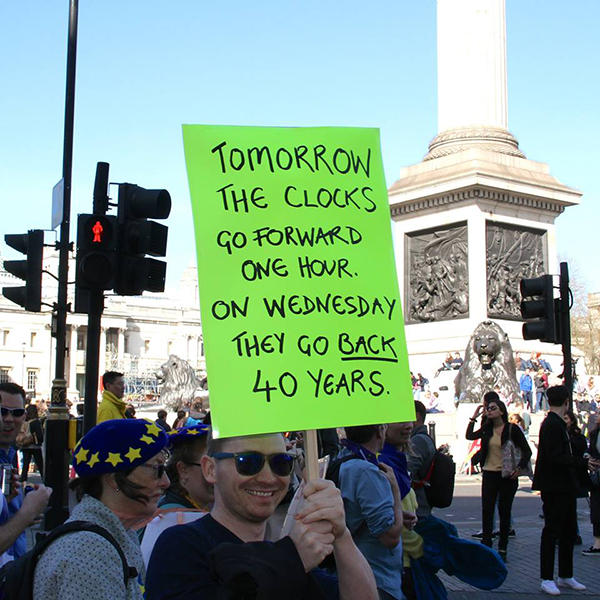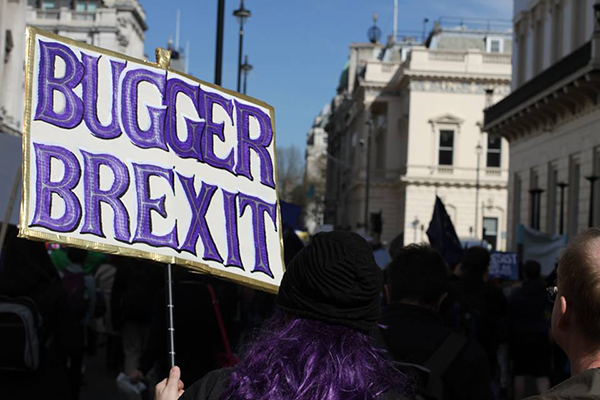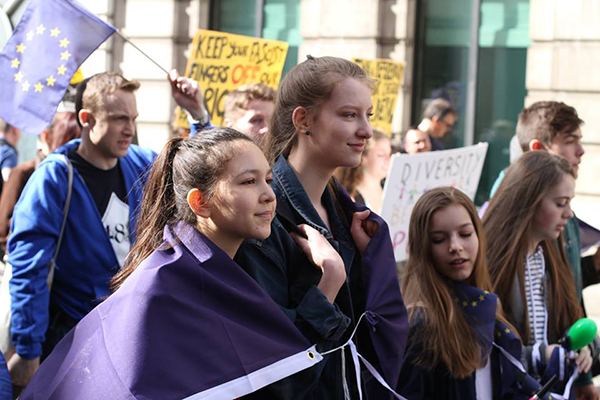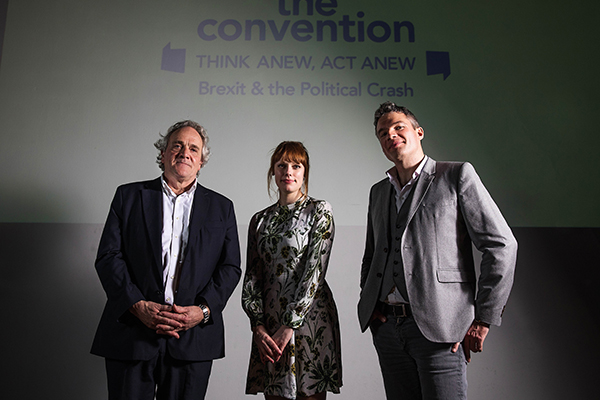From left to right: The Convention co-founders Henry Porter, Rebecca Ashton, and producer Julien Planté
Let’s cut right to the chase: If you’ve spent any time at all questioning what the future of the UK could be after Brexit, there are places to wonder that aren’t your Facebook status, or your Twitter timeline. There are ways to make your voice heard that aren’t online petitions or blazing rows with family members. We’ve been led to believe it’s a done deal. We’ve been told to get over it, and we’ve been told in all manner of Pythonesque ways that “Brexit means Brexit”.
But there’s still plenty left to be decided on, and when the Government is this adamant to ignore any line of questioning, you have to ask why they’re so keen to wrap this up away from public input. To open up the debate to a public referendum only to then shut down the argument is absurd. It’s time to question. And it’s time for a detailed, constructive and expansive conversation on the future of the UK.
At the start of this month, on 5th April, Bianca Jagger, Brian Eno, Myriam D’Abo, Robert Yates, Sinead Cusack and open-Deomcracy editor in chief Mary Fitzgerald joined a crowd of over one hundred people to hear form the founders of The Convention on Brexit and the Political Crash, which launches on 12th and 13th May.
Co-founders Henry Porter, Rebecca Ashton and our Guest Editor this week, and Convention producer, Julien Planté, will host the debate that is absent from Parliament: the impact of Brexit and the UK’s future against a backdrop of populist insurgencies sweeping Western democracies.
Taking place in Central Hall Westminster, The Convention sets out to cover ground the wider media and current government would rather the UK remained distracted from. Its speakers will be asking questions on the impact of a ‘Hard Brexit’ on the Union, the economy, the NHS, security, scientific exchange and the environment. It’s not over yet, and there are still plenty of decisions to be made and lines to draw, and The Convention will be debunking the confusion many people have felt in the wake of 2016’s referendum, and calling on the Government to finally answer.
Already confirmed, The Convention’s speakers will include: Pulitzer prize winner Anne Applebaum, Alistair Campbell, Rachel Clarke, Denis Campbell, Nick Clegg, Jonathan Freedland, Peter Francopan, Jim Gallagher, Timothy Garton Ash, Caroline Lucas, Ian McEwan, Sonia Sodha and Sashy Nathan.
Here, this week’s Guest Editor Julien Planté explains to us here in no uncertain terms why constructive debate around Brexit is anything but over- and why we all need to continue questioning what we’ve been told this far.
Run Riot: What do you think is something that went unsaid in the run up to the Brexit referendum last year?
Julien Planté: There is a long list here! From the repeal bill to all legal knots with Europe that we now have to untie, from students travelling abroad thanks to Eurasmus program to the NHS… The EU is not perfect but we haven’t talked about all the good things that we’re getting from it. It was not only an economic and strategical alliance. If you think of the effects of Brexit on agriculture, education, the environment and healthcare, for example, it’s enough to make you yearn for proper discussion.
What astonished me most about the run up to the referendum last year is the number of lies. Brexit happened because nobody challenged the lies about the immigrants “swarming” into our nation (they weren’t); or the unelected Brusellcrats interfering in every aspect of British life (they’re not); or that we’re pumping money into the huge rapacious bureaucratic mechanism and getting nothing in return (we’re not); and that it was all part of some fiendish Franco/German plot to annexe all the member states into some vast federal Euro-Reich under whose jackboot the British people would forever squirm (it’s not, they’re aren’t and they wouldn’t).
Brexit is a tower of lies. We must push it over.
So it’s not only about what went unsaid last year before June 23rd, it’s also about what was said, and we now have to take the government to account.

RR: What do you hope The Convention gets people talking about?
JP: We have a very simple attitude to The Convention. I personally think Brexit is probably irreversible – it was a moment in time and cannot be undone. And that is not just a statement of political reality: we have all been somewhat changed by it – for good or worse – and we cannot go back to what we were, nor can the country. That would return us to the point that led to so much dissatisfaction and, indeed, to Brexit.
However, we do believe that it is worthwhile pursuing two things. The first is to prod Parliament to the broader and more detailed debate that describes what this divorce entails. This is not just a break with the EU; it is a very Conservative project and that needs to be watched, especially on rights and environmental controls (and of course the press has been intentionally remiss on all of this).
The second aim, apart from having all sides represented in this debate, is to cast forward and start to think how we emerge from this sour and ill-tempered period. The moment we have now is to think anew, find new voices, renew politics. That’s what our Convention is about. We do also think the British public – or an energised Parliament – must be given a meaningful vote on the negotiated deal.
As with the ongoing divorce reference, it’s not about sitting in therapy chairs, but rather we need to start working on what is best for the future of the children of this divorce. So we will have sessions about the economy, environment, the NHS, education… and also about the disUnited Kingdom, focusing on Scotland and Northern Ireland…
But the two-day event is not designed exclusively to address the UK’s 2016 vote in favour of leaving the EU: the Convention is also about the Political Crash. We want to respond to the rapid change in politics that has occurred in the West over the last year. We think there is a threat to democratic and liberal values, so we’re also going to have sessions about Broken Politics and Broken Media for example.
RR: After the success of the Brexit campaign last year, and the endless soul-searching from friends and family I saw (and certainly took part in) as to why we could ever let such a referendum take place, I found that by the time 28th March rolled around, the actual event of us beginning to leave the EU felt oddly anti-climatic. From frank debates within families to discussions on a national scale, what scope do you hope to cover with The Convention? Would you say the time for being cynical is over?
JP: Personally I was so sad on that 28th March when May triggered Article 50. A few days before I went to the Unite for Europe march and I felt so high: at that moment, on Parliament Square, I saw the country I love. I’ve been living in the UK for 16 years, it’s my home now. My wife is British, and we’ve got binational and bilingual kids. We are a European family.
So it’s not about being cynical, but I don’t think people should just turn the page and let Theresa May have an easy road to Brexit. Even if Brexit is irreversible we must fight back. It’s the future of the nation that is at stake here. She has to present her plans, and they must be discussed at the Parliament. At the Convention we want to hold the debate that is not being held at the Parliament. We want to shake things up at Westminster, and force the government to listen to the 48% who voted Remain, and all the other ones who didn’t get the chance to cast their vote.
What the Government systematically tries to do is bully and delegitimise anyone who disagrees with their narrow world view. It’s a ludicrous thing when 16.1m people – that’s more than have ever voted for a party in a general election – voted for a different future, when 70 per cent of youngsters have voted for a different future. We mustn’t let this happen.
Democracy is about letting people free to debate, and even to oppose and to protest. I heard this morning on the radio that Rosa Luxemburg, philosopher, economist, anti-war activist and revolutionary socialist, once said: “Freedom is always freedom to think otherwise”.
RR: How much do you think false news and the media as a whole are to blame for the outcome of the 2016 referendum? Does it help to place blame?
JP: A certain type of press is certainly responsible for the situation we’re in. The Daily Mail is trash and tabloids are a pile of crap. I actually think they are the cancer of this country. Telling only one side of the story is not the truth. It could be true, or A truth, but it’s not THE truth. The influence those papers have on public opinion is devastating. I would urge everyone who read those line to never ever again give those papers a penny more from their pocket.
Regarding media as a whole, I believe that Murdoch is the architect of the world we live in, between Fox News and Sky in the UK, with their tremendous power over the people. They certainly influence their choice. With the referendum people were asked an important question about the future of their country, and not only they didn’t have the knowledge to answer, media companies such as Sky broadcast network poisoned their views. Same advice to your readers: if you’ve got a Sky box at home, cancel your direct debit.
What’s even more sad is when BBC doesn’t do their job as a public service and quickly take part on one side as soon as the new government was in place. I don’t think it’s right that the BBC invite Farage so often onto their shows. It gives him credibility, people get used to him, and then start to agree with him.

RR: What do you think it is about Brexit that makes ‘Remain’ campaigners unable to ‘accept’ the result, as so many ‘Leave’ campaigners have implored them to do?
JP: It’s very hard to accept because Europe is part of our citizenship. And I believe that in some respect Brexit is a violation of human rights. Three substantial groups were denied the opportunity to vote (EU citizens resident in the UK; expats who have lived outside of the UK for 15 years or mote; young people aged between 16 and 18) when inclusion of any two of those group would almost certainly have reversed the result. Rational democratic decision-making was negated by a campaign of exaggeration and lies. And finally unnecessary last-minute poll predictions encouraged complacency in the turnout for Remain.
I take this opportunity here to say that the term ‘Remoaner’ used by so many is not right. First it’s an insult to our democratic right to respond, to oppose and to think otherwise (thinking of Rosa Luxemburg again). And then we’re not moaning, we’re shouting.
RR: Post-referendum (and then again after the US Presidency vote in autumn 2016), there was plenty of discussion online of post-truths, echo chambers and why social media could be to blame for the way people now form opinions through wider reading online. How much do you believe social media can be blamed?
JP: Social Media is a double edge sword. The internet has certainly changed politics, but I would not blame social media for Brexit or Trump. People remain in control. Yes, Leavers and Trump have managed to turn social media to their advantage, but it’s up to you to block people you don’t like, or turn it off completely.
At The Convention we first tried to engage with some people on Facebook who consistently were trolling our page, but it quickly gets nasty or a bit sad. Better to leave them alone with their irrelevant, offensive and at times grammatically incomprehensible comments that are neither productive nor conducive to a healthy and intellectual discussion.
Ultimately I don’t think Social Media can change our true nature. Look at Hilary Clinton: she had all the support we could think of, Beyoncé, Oprah… There was loads of tweets, posts, videos… It didn’t change the vote.

RR: Have we been headed for a referendum all along? Do you think there can be an upside to the Brexit result for ‘Remain’ campaigners?
JP: Maybe… The UK always had one foot outside of Europe. It’s something we will explore at The Convention, and we will have speakers from all sides being represented, including some Leavers. The Convention can only exist as a debating space for those who subscribe to democratic values of freedom of speech.
I personally don’t think there could be an upside to Brexit though, at least not short term. There is no chance to ‘take control’ – it’s actually the opposite. The next two years will be about negotiating that deal with Europe, but as a journalist from the Financial Times wrote recently, it’s not going to be the usual ‘win-win’ type of business negotiations. On the contrary it’s a ‘lose-lose’ negotiation. It’s about damage control, and survival.
Maybe after 5 or 10 years, when the nation had the time to heal, the UK can move forward as a great nation. But then will there be a Kingdom left? Maybe Scotland will have left… How can we find an upside for England on its own?
RR: How dangerous is the (as one The Convention guest speakers, Anne Applebaum says) ‘underrated force’ of nostalgia within the context of Brexit?
JP: Anne recently wrote an article in The Washington Post about nostalgia. It has got this power to affect how people understand and react to change. I personally have no idea what people are referring to when they talk about this glorious period when the UK had full sovereignty. Do they refer to the British empire with colonies? The truth, says Applebaum, is that nostalgia is selective, it offers false views or the past and therefore false hope for the future. To me that nostalgic picture of ‘Great’ Britain is something sepia, not very attractive. To move forward you need to move together.
The Convention, the first large scale event to offer citizens a chance to hear and take part in crucial debates about the UK’s future takes place on 12th and 13 May at Central Hall Westminster. Find the Run Riot listing here. Tickets are available here, and you can follow The Convention on Twitter at @The_Convention_, and you can follow Julien on Twitter at @julienplante
